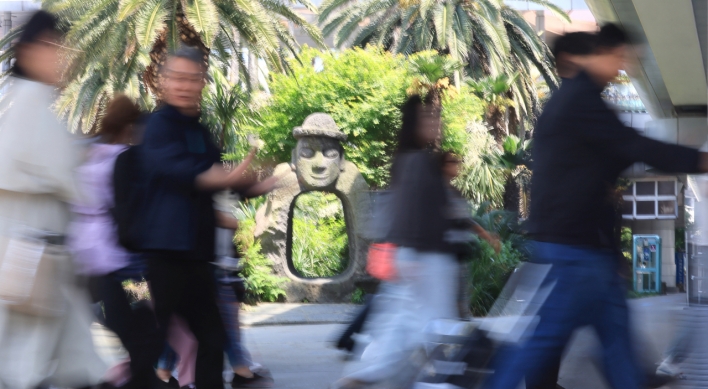[Editorial] Japan’s security legislation
Move carries complicated implications for Seoul
By Korea HeraldPublished : July 19, 2015 - 21:03
Japanese Prime Minister Shinzo Abe has stayed firm on his path toward enacting controversial security bills by September despite surging parliamentary and public opposition.
His Liberal Democratic Party and its junior partner in the ruling coalition, the New Komeito Party, unilaterally passed the bills in the lower house of the Diet on Thursday. They require approval by the upper chamber to become law.
The security legislation centers on allowing Japan to exercise its right to collective self-defense, which empowers it to fight alongside its allies even when not under attack itself.
Abe, a staunch nationalist, has pressed ahead with what he calls a normalization of Japan’s military posture. But his determined push for the unpopular bills is coming at a political cost.
Abe’s support rate has dropped to 39 percent, lower than his 42 percent disapproval rating, according to a poll by a leading Japanese newspaper early last week. The shift in military policy was backed by only 26 percent of respondents, while 56 percent objected to it.
Tens of thousands of people held a rally in Tokyo to protest the passage of the security bills, which nearly 90 percent of Japan’s constitutional experts argue contradict the country’s pacifist constitution.
Abe’s declining popularity is reminiscent of the political course taken by his grandfather Nobusuke Kishi, whose support for a security treaty with the U.S. resulted in his resignation as prime minister in the face of a strong backlash in 1960.
Abe invoked the case of his grandfather early this month, when he said his push to bolster Japan’s military role would be vindicated by history. He noted that a majority of the public now supported the renewal of the U.S.-Japan security treaty.
Historical judgment will have to wait for the passage of time. In contrast to his grandfather, however, Abe is unlikely to be forced to step down.
Japan’s neighboring countries need to brace for the prospect of Abe being reelected as LDP leader, hence retaining the premiership, in a party conference in September, with the security bills being enacted into law.
In a statement issued Thursday, South Korea reaffirmed it would not tolerate Japanese military activities on the Korean Peninsula without its prior consent.
In the months ahead, Seoul needs to hold close consultations with Tokyo to ensure its consent should also precede Japan’s military operations against North Korea.
Seoul is now required to take a sophisticated strategic approach to Japan’s security legislation.
Despite the memory of Japan’s past militarism that colonized the peninsula in the early 20th century, Abe’s move to expand Tokyo’s military role in the framework of its alliance with Washington will help deter provocations from North Korea. On the other hand, it may heighten caution from China against South Korea’s closer linkage to the strengthened U.S.-Japan alliance, which Beijing sees is aimed at keeping its growing power in check.
Under these circumstances, Seoul officials may find room for inducing China to be more active in curbing Pyongyang’s nuclear and missile programs.
His Liberal Democratic Party and its junior partner in the ruling coalition, the New Komeito Party, unilaterally passed the bills in the lower house of the Diet on Thursday. They require approval by the upper chamber to become law.
The security legislation centers on allowing Japan to exercise its right to collective self-defense, which empowers it to fight alongside its allies even when not under attack itself.
Abe, a staunch nationalist, has pressed ahead with what he calls a normalization of Japan’s military posture. But his determined push for the unpopular bills is coming at a political cost.
Abe’s support rate has dropped to 39 percent, lower than his 42 percent disapproval rating, according to a poll by a leading Japanese newspaper early last week. The shift in military policy was backed by only 26 percent of respondents, while 56 percent objected to it.
Tens of thousands of people held a rally in Tokyo to protest the passage of the security bills, which nearly 90 percent of Japan’s constitutional experts argue contradict the country’s pacifist constitution.
Abe’s declining popularity is reminiscent of the political course taken by his grandfather Nobusuke Kishi, whose support for a security treaty with the U.S. resulted in his resignation as prime minister in the face of a strong backlash in 1960.
Abe invoked the case of his grandfather early this month, when he said his push to bolster Japan’s military role would be vindicated by history. He noted that a majority of the public now supported the renewal of the U.S.-Japan security treaty.
Historical judgment will have to wait for the passage of time. In contrast to his grandfather, however, Abe is unlikely to be forced to step down.
Japan’s neighboring countries need to brace for the prospect of Abe being reelected as LDP leader, hence retaining the premiership, in a party conference in September, with the security bills being enacted into law.
In a statement issued Thursday, South Korea reaffirmed it would not tolerate Japanese military activities on the Korean Peninsula without its prior consent.
In the months ahead, Seoul needs to hold close consultations with Tokyo to ensure its consent should also precede Japan’s military operations against North Korea.
Seoul is now required to take a sophisticated strategic approach to Japan’s security legislation.
Despite the memory of Japan’s past militarism that colonized the peninsula in the early 20th century, Abe’s move to expand Tokyo’s military role in the framework of its alliance with Washington will help deter provocations from North Korea. On the other hand, it may heighten caution from China against South Korea’s closer linkage to the strengthened U.S.-Japan alliance, which Beijing sees is aimed at keeping its growing power in check.
Under these circumstances, Seoul officials may find room for inducing China to be more active in curbing Pyongyang’s nuclear and missile programs.
-
Articles by Korea Herald







![[Weekender] Korean psyche untangled: Musok](http://res.heraldm.com/phpwas/restmb_idxmake.php?idx=644&simg=/content/image/2024/05/02/20240502050841_0.jpg&u=)



![[Herald Interview] ‘Time to Be Strong’ follows retired K-pop idols’ self-discovery](http://res.heraldm.com/phpwas/restmb_idxmake.php?idx=644&simg=/content/image/2024/05/03/20240503050550_0.jpg&u=)






![[Eye Interview] 'If you live to 100, you might as well be happy,' says 88-year-old bestselling essayist](http://res.heraldm.com/phpwas/restmb_idxmake.php?idx=652&simg=/content/image/2024/05/03/20240503050674_0.jpg&u=)
